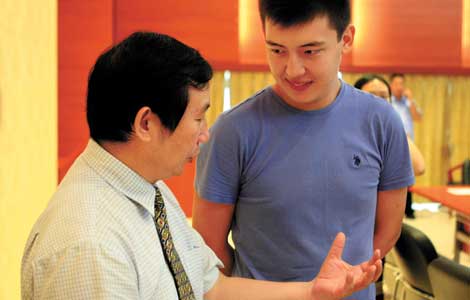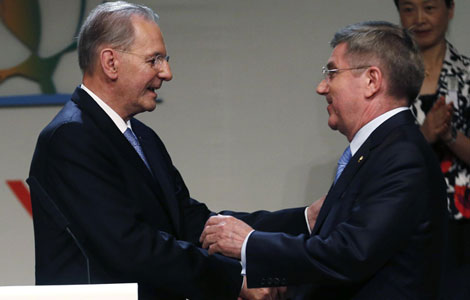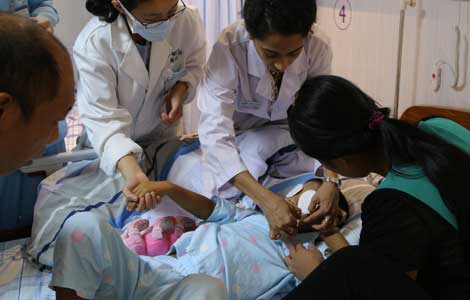Demand up for fluency in regional languages
Updated: 2013-09-12 07:33
By Zhao Xinying (China Daily)
|
||||||||
Since the beginning of the month, Nurjemile has worked for China Petroleum Engineering and Construction Corp as a translator and secretary in Turkmen.
The Kazakh woman from the Xinjiang Uygur autonomous region is envied by many of her friends for having such a good job, which offers a good salary and chances to travel abroad.
The 26-year-old, who graduated with a master's degree in Russian and Turkmen from Minzu University of China in June, said she was lucky because her educational background helped her get the job.
"A branch office of the company was recruiting a translator and secretary for this Central Asian language then, but there were very few college graduates of the major in our country. So, I was chosen," she said.
As exchanges and cooperation between China and Central Asian countries become more frequent, the demand for employees fluent in Central Asian languages will grow.
That is not only good news for graduates like Nurjemile, but also a chance for development for universities that offer majors related to Central Asian languages.
From 2003, Minzu University began establishing majors that combined Russian with one of the Central Asian languages, including Turkmen, Kazakh, Kyrgyz and Uzbek. The combined majors aimed to train students mainly in Russian while also enabling them to master a Central Asian language.
Zhang Na, director of the Russian-Central Asian Languages Department at Minzu University, said they did so mainly because professionals with such language backgrounds are scarce and inadequate to meet demands.
Zhang said although Russian remains a means of communication for the former members of the Soviet Union, their native languages, such as Turkmen, Kazakh, Kyrgyz and Uzbek, are now their national languages.
"These countries are near neighbors of China, and they have built friendships with China, especially because in China we have cross-border ethnic groups like Kazakh, Uzbek and Kyrgyz," she said.
The university started recruiting students for the department in 2003 and now has about 100 students and more than 200 graduates.
Nurjemile was one of the first 25 students in the Russian-Turkmen major, which was established by the university in 2006.
Apart from regular Russian courses, Nurjemile and her classmates were also given Turkmen courses by Chinese and Turkmen teachers during their second and third years of college.
"The things we learned during university are really practical because my daily work now is to deal with all kinds of mail and documents written in Turkmen," Nurjemile said.
In the future, she could be sent to work in the branch office of the company in Turkmenistan, where she would have more chances to use the language.
However, resources for learning these languages are still far from adequate in China.
As the first batch of students majoring in Russian and Turkmen, Nurjemile and her classmates used Turkmen textbooks compiled by their teachers as professional texts in Turkmen were rare in China.
Gulbanum Kebaitul, an Uzbek teacher at Minzu University, agreed with Nurjemile.
"As the Uzbek language is a new teaching field in our country, like other Central Asian languages, it's obvious that teachers and students are short of firsthand materials in the language," said the teacher, who is also from Xinjiang.
To solve that problem, the university has been sending students and teachers of those majors to Central Asian countries to study, in hopes that their skills will greatly improve.
Gulbanum is one of those teachers. She is now studying at a university in Tashkent, the capital of Uzbekistan, for a doctorate on the linguistics of Uzbek. Gulbanum said while Russian was the main language spoken then, Uzbek is now used more often.
"It made me realize that learning Uzbek well is important for students of our major, especially for those who would like to work for communication and cooperation between China and Uzbekistan," she said.
Zhang, the director, said there are few universities in China with majors related to Central Asian languages. Therefore, graduates from Minzu University who can speak both Russian and a Central Asian language are welcomed, especially in sectors such as petroleum, customs and research on Central Asian countries.
"We may consider establishing independent majors for Asian languages in the future," Zhang said. "We also plan to set up a research center on Central Asian countries as we gain more and more resources and experience in training teachers and students, as well as compiling textbooks."
zhaoxinying@chinadaily.com.cn
(China Daily USA 09/12/2013 page4)

 Premier stresses transformation of the economy
Premier stresses transformation of the economy
 Soyuz capsule returns from space station
Soyuz capsule returns from space station
 China's Christian churches reduce leaders' age ceiling
China's Christian churches reduce leaders' age ceiling
 Student's rare blood bonds Kazakhstan and China
Student's rare blood bonds Kazakhstan and China
 Apple's low-end phone price disappointing
Apple's low-end phone price disappointing
 US marks 9/11 anniversary
US marks 9/11 anniversary
 German Bach elected as IOC president
German Bach elected as IOC president
 Implant surgery for boy's eyes a success
Implant surgery for boy's eyes a success
Most Viewed
Editor's Picks

|

|

|

|

|

|
Today's Top News
China Daily Asia Weekly wins media award
Report questions US firms pursuing cloud computing in China
Reducing poverty gains momentum in Asia
China turns to US sorghum for animal feed
China's global firms face 'trust gap'
Li stresses transformation of economy
US delivers weapons to Syrian rebels
FM dismisses Philippine accusations
US Weekly

|

|






